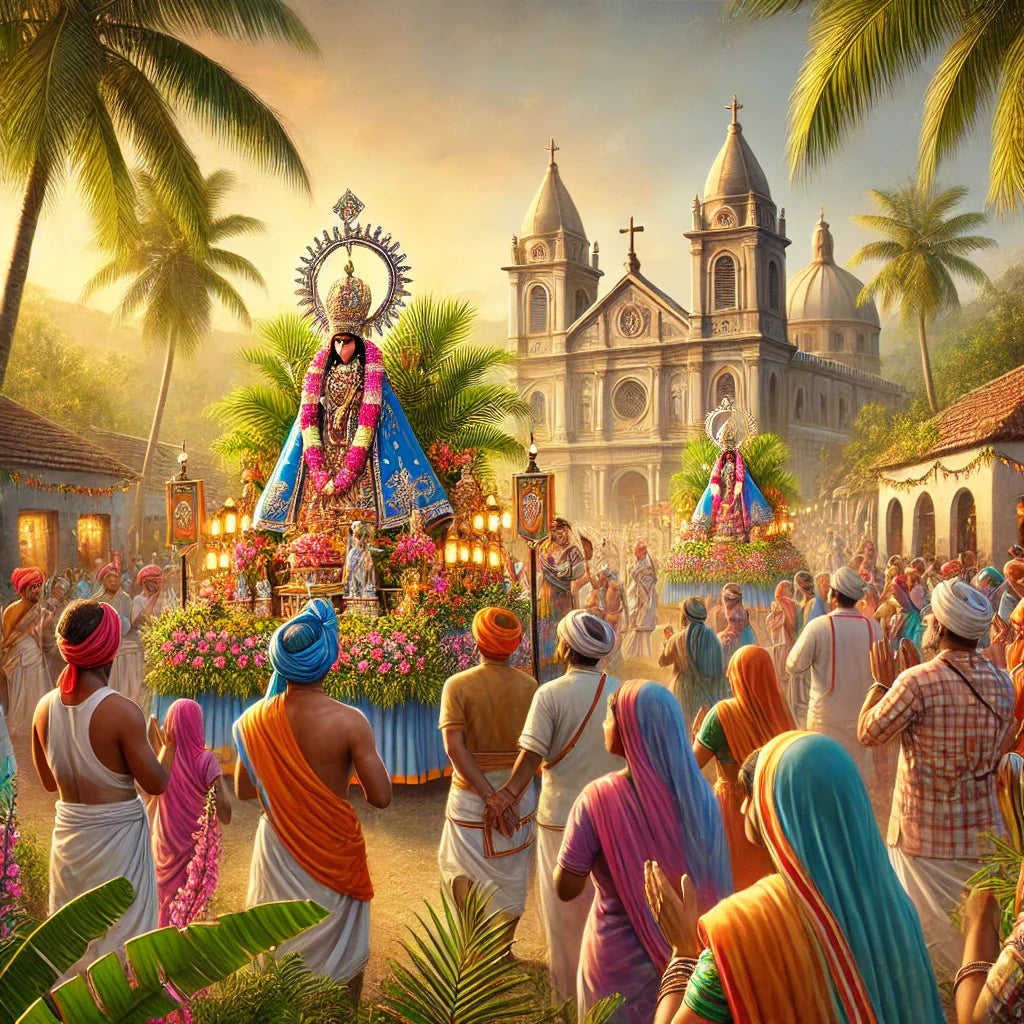
Oral Traditions & Folk Devotions
|
|
Time to read 4 min
|
|
Time to read 4 min
The Christian faith in India is not just a tale of colonial influence or missionary work; it is deeply rooted in oral traditions, folk songs, and devotions that have been nurtured and passed down through generations. These practices highlight the profound integration of Christianity with local cultures, creating a vibrant tapestry of faith. In this article, we explore the unique aspects of Indian Christian oral traditions, including hymns, Marian devotions, saint festivals, and processions that enrich spiritual life.
Oral traditions form the bedrock of Indian Christian heritage, particularly in rural and indigenous communities. Before written texts became widespread, faith was transmitted through storytelling, hymns, and community prayers. These practices ensured the survival and growth of Christian teachings while weaving them into the cultural fabric of local communities.
Christian hymns in India often draw inspiration from local languages, musical forms, and instruments. These hymns, sung during liturgies, festivals, and personal devotions, embody a deep connection to both faith and culture.
Tamil Christian Keerthanai : Tamil Christians have a rich tradition of composing and singing devotional songs known as keerthanai. These songs often incorporate Carnatic music styles and are performed during liturgical services and festivals.
Konkani Hymns in Goa : The Goan Christian community has preserved centuries-old Konkani hymns, blending Western choral traditions with Indian melodies. Songs like "Sangata Sahibas" are iconic examples sung during processions and church services.
Santali Christian Songs : In tribal regions like Jharkhand, Santali Christians sing folk songs using traditional instruments like the banam and tumdak. These songs often narrate Biblical stories in a way that resonates with tribal life.
Marian devotions hold a special place in Indian Christianity, reflecting the veneration of the Virgin Mary as a source of comfort and intercession. These devotions are expressed through unique practices and celebrations across different regions.
Velankanni, often called the “Lourdes of the East,” is a Marian shrine in Tamil Nadu that attracts millions of devotees annually. Pilgrims come from diverse faiths to seek healing and blessings. The annual feast, celebrated in September, includes vibrant processions, flag hoisting, and traditional Tamil hymns.
Kerala’s Syrian Christian community has a long-standing tradition of reciting the rosary in Malayalam. Family members gather for evening prayers, often accompanied by singing Marian hymns such as "Amme Matha."
Throughout India, Marian processions are held to honor the Virgin Mary. In Goa, the Feast of Our Lady of the Immaculate Conception is celebrated with grand processions, music, and floral decorations. These events combine deep piety with festive fervor.
Indian Christians celebrate the lives of saints with unique festivals and rituals. These events are often marked by processions, cultural performances, and community feasts.
As the patron saint of Indian Christians, St. Thomas’ feast day on July 3rd is celebrated with great enthusiasm, particularly in Kerala and Tamil Nadu. Special liturgies, processions, and reenactments of the apostle’s missionary journeys highlight the day.
The Feast of St. Francis Xavier, held in December, is one of the most significant events in Goa. Devotees from across the world visit the Basilica of Bom Jesus, where his relics are preserved. The event includes a nine-day novena, grand processions, and Konkani hymns.
Many Indian parishes celebrate saints with regional significance. For example, the Feast of Our Lady of Mount Mary in Bandra, Mumbai, draws people of all faiths to offer prayers and light candles.
Religious processions are a hallmark of Indian Christian devotion, blending spiritual reverence with cultural vibrancy. These processions often feature decorated statues, traditional music, and community participation.
On Palm Sunday, Indian Christians reenact Jesus’ triumphal entry into Jerusalem. Parishes organize processions with palm leaves, hymns, and readings from the Gospels.
In many parts of India, Good Friday is observed with a Way of the Cross procession. Participants carry wooden crosses and sing somber hymns, retracing Christ’s path to Calvary.
Easter Vigils often culminate in joyous processions, with parishioners carrying candles and singing hymns to celebrate the Resurrection. These events symbolize the victory of light over darkness.
The survival and vibrancy of oral traditions and folk devotions owe much to local communities. Elders often take on the role of custodians, ensuring that hymns, stories, and rituals are passed down to younger generations. Choir groups, youth associations, and women’s guilds also play a significant role in organizing and sustaining these traditions.
Despite their richness, oral traditions and folk devotions face challenges such as urbanization, modernization, and declining interest among younger generations. However, efforts are being made to preserve these practices:
Documentation Projects : Scholars and church organizations are recording hymns, prayers, and oral histories to ensure their preservation.
Cultural Festivals : Events like the Goa Liturgical Music Festival celebrate traditional Christian music and encourage its continuation.
Youth Involvement : Churches are actively involving young people in choirs, processions, and liturgies to keep these traditions alive.
The oral traditions and folk devotions of Indian Christianity are a testament to the enduring faith and creativity of local communities. From Tamil keerthanai to Marian processions, these practices showcase a profound integration of spirituality and culture. As custodians of this heritage, it is vital to celebrate, preserve, and pass on these traditions to future generations, ensuring that the rich tapestry of Indian Christian devotion continues to thrive.